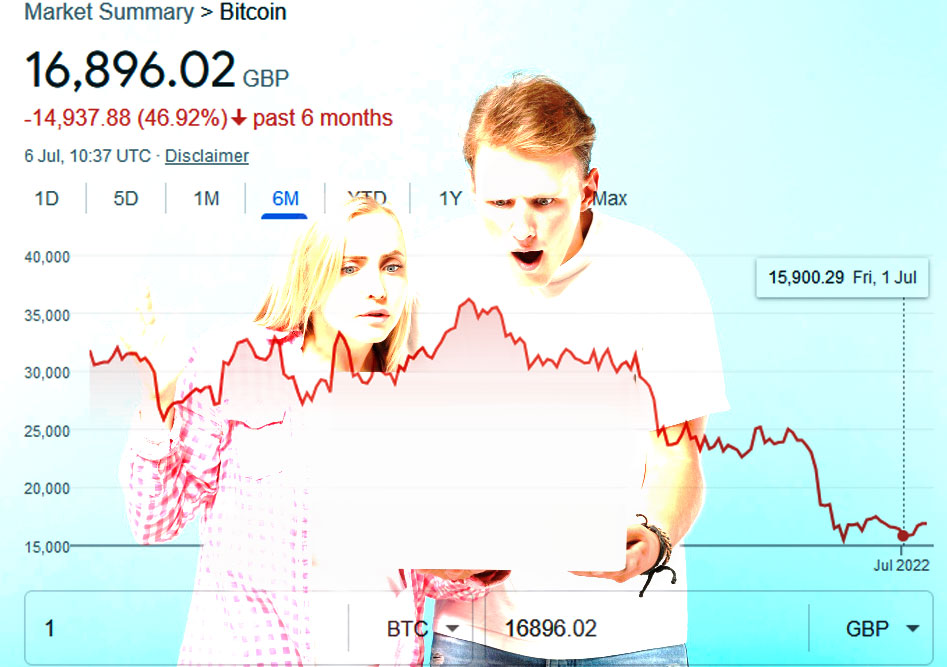First off, bitcoin is not a Ponzi scheme.
 Bullion.Directory precious metals analysis 06 July, 2022
Bullion.Directory precious metals analysis 06 July, 2022
By Keith Weiner
CEO at Monetary Metals
When investors withdraw money, he pays them some of the new money coming from new investors. Ponzi schemes blow up sooner or later, when the sponsor’s spending and withdrawals drain the bank account dry.
Bitcoin is closer to a pyramid scheme. A pyramid is not necessarily a fraud, and not necessarily illegal. Bitcoin does not promise any particular return, certainly not in the sense of a yield on invested capital. You pay X dollars to a seller of bitcoin, not based on an explicit promise, but based on the expectation that in the future a buyer will pay you more than X dollars. Like a Ponzi, the gains come from new investors. Unlike a Ponzi, there is no common pool into which your dollars go.
One does not put dollars into bitcoin. One does not convert dollars to bitcoin. One forks over one’s savings to a former owner of bitcoin, who sells the bitcoin to you. The seller now has the dollars which he can spend as his profits.
The seller is spending your savings.
Bitcoin is therefore like any other bull market fueled by the falling interest rate. They serve as a mechanism for the conversion of one party’s capital into another’s income, to be consumed. No one wants to be the Prodigal Son, but the falling interest rate incentivizes a Prodigal Society.
Like a Ponzi, a pyramid collapses when more people want to “withdraw” (i.e. sell) than who want to buy.
The above does not mean that the price of bitcoin will collapse tomorrow. Or next year. It could be a penny, a million bucks, or anywhere in between—and probably will.
Do not take our words as a moralizing admonition not to trade. The central banks have waged a war on interest. They have deprived people of a means to earn a yield. Everyone is therefore forced to turn to speculation as a surrogate for yield.

Volatility
It is commonly assumed that as bitcoin grows—whether in price or in trading volume—its price will stabilize. However, despite the total value of all bitcoins reaching over $1.15 trillion in October, there was a wicked drop in price from over $67,500 to $19,000—it has lost almost 70% of its value this year.
From the perspective of a market observer, the idea of bitcoin price stability seems to be an article of faith.
Let’s drill deeper into the economics of price stability. Suppose an industrial commodity was used in manufacturing products. Pipe, wire, electronics, and motors are made with copper. And each has a market price, based on the value of using pipes, wires, etc.
If the price of copper fell, it would be an incentive to manufacture more pipes and wires, etc. If it rose, it would be a disincentive to manufacture pipes and wires etc. (or an incentive to switch to the next-best alternative to copper). The price of pipes and wires can only rise so far before the users do not have an economic benefit from them.
And there are incentives on the production side as well. If the price of copper falls, copper miners have reduced incentive to mine copper ore. If it falls below their cost of mining, then they stop. If the price rises, then they have a powerful incentive to increase their production.
Copper mining consumes oil and labor, and other things. So, the cost of copper depends on the prices of these things. And hence the price at which a copper mine can make money.
The prices of all things in the real world are thus tied to the prices of all other things.
Bitcoin has no such ties. One objection might be that producing bitcoin uses electricity, so is tied to that price. This is true, but bitcoin was designed to be produced at a certain rate. If the cost of electricity rises, then what happens is not less bitcoin production—but fewer bitcoin miners competing to win the predetermined bitcoin production quota.
For copper, the bid is set by the marginal user whether this be wires, pipes, etc. For bitcoin, the bid is set by the marginal speculator.
Redeemability
Normally[1], a currency is redeemable for money. This means that if there is a sudden decrease in the desire of the market participants to hold a currency, they go to the currency issuer and demand redemption.
So long as the issuer has been honest and prudent, it will be able to redeem the money demanded (and if not, it’s the equity holders who bear the losses). Thus, the value of the currency does not drop.
But bitcoin is irredeemable. There is no asset backing it. Bitcoin is where the buck stops (forgive us our pun). OK, but what happens if there is a sudden decrease in the demand for bitcoin? The price must drop.
With redeemable currencies, it is the quantity that varies with demand. With bitcoin, quantity is fixed at any given moment (the quantity is centrally planned to rise at a determined rate, which diminishes, until it finally reaches 21 million bitcoins). Therefore, it is bitcoin’s price that varies with demand.
The Marginal Speculator
One other thing needs to be said about volatility. Suppose it were true that everyone could know and agree on what the correct ultimate price for bitcoin is. Let’s call this magical price $1,000,0000 or MP for short. Of course, if people did not agree on MP, they would buy and sell. Waves would develop, and chart followers would pile-on.
But let’s consider what market participants should do, assuming they all agreed on MP. Suppose everyone bought and bought, until the price finally reached MP. What would they do when it finally happened?
Sell.
Many of them are in it to make money and by money, here, we mean dollars. They are in bitcoin for the trade of a lifetime. After all, bitcoin is to go up about 30 times. But once it hits its ultimate value, there’s no more gain. So, these people sell and look for the next bubble inflating somewhere (this being the zero-yield world after central bank victory in the War On Interest).
This selling causes the price to drop. And since everyone knows this will occur, the smart thing to do is sell before the price reaches MP. With bitcoin, or indeed any market with the bid set by speculation, there are only endless waves of buying and selling, by endless traders trying to front-run their peers.
It’s a Keynesian Beauty Contest. Suppose a newspaper (think back to the 1930’s) ran a contest. They printed the pictures of many women, and said you had to pick the prettiest one. But the prettiest is determined by the vote of all the other people sending in their entries.
The goal is not to pick the one who you think is prettier, but in Keynes’ words:
“It is not a case of choosing those [faces] that, to the best of one’s judgment, are really the prettiest, nor even those that average opinion genuinely thinks the prettiest. We have reached the third degree where we devote our intelligences to anticipating what average opinion expects the average opinion to be.”
In other words, it’s not what you think the bitcoin MP should be. It’s not what you think others think MP should be. It’s what you think others think that others think MP should be.
No wonder the price is volatile!
[1] By normal, we mean in a fully and consistently free market, where sophisticated mechanisms for coordination have evolved.
Keith Weiner


Keith Weiner is founder and CEO of Monetary Metals, the groundbreaking investment company monetizing physical gold into an interest-bearing asset, paying yields in gold, not paper currency.
Keith writes and speaks extensively, based on his unique views of gold, the dollar, credit, the bond market, and interest rates. He’s also the founder and President of the Gold Standard Institute USA. His work was instrumental in the passing of gold legal tender laws in the state of Arizona in 2017, and he regularly meets with central bankers, legislators, and government officials around the world.
This article was originally published here













Leave a Reply